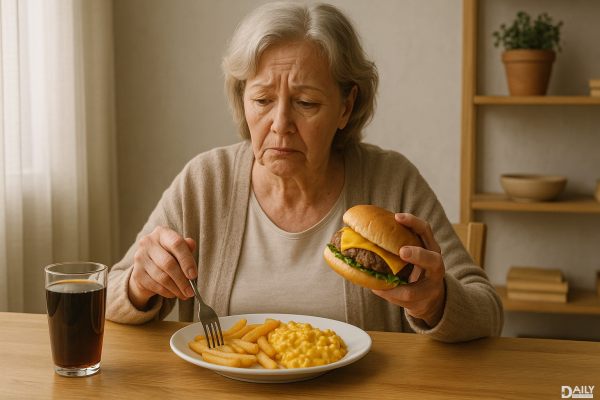If you're over 60, your eating habits might be doing more harm than good—even if they seem harmless. As we age, our metabolism slows down, nutrient absorption becomes less efficient, and certain foods that were once no big deal can suddenly become problematic. The good news? A few simple tweaks can make a world of difference in how you feel and function. Let’s dive into the sneaky eating habits that could be sabotaging your golden years and how to turn things around.

That bowl of cereal or piece of toast might seem like a quick and easy way to start the day, but if it’s missing protein, you’re setting yourself up for energy crashes and muscle loss. As we age, maintaining muscle mass becomes critical for mobility and independence. A low-protein breakfast won’t cut it. Instead, try Greek yogurt with nuts, scrambled eggs with veggies, or even a protein smoothie. Your muscles—and your future self—will thank you.
Frozen dinners, canned soups, and packaged snacks might be convenient, but they’re often loaded with sodium, preservatives, and unhealthy fats. These can contribute to high blood pressure, inflammation, and sluggish digestion—none of which are friends to an aging body. Opt for whole, minimally processed foods whenever possible. Batch-cooking simple meals like roasted chicken, quinoa, and steamed veggies can save time without sacrificing nutrition.
That glass of OJ might seem like a healthy choice, but fruit juices are sugar bombs in disguise. Without the fiber found in whole fruit, they spike blood sugar quickly, which can be especially risky for those managing diabetes or prediabetes. If you love juice, try diluting it with water or better yet—eat the whole fruit instead. You’ll get the sweetness along with fiber, vitamins, and a slower energy release.
Thirst signals weaken with age, making dehydration a sneaky issue for older adults. Chronic dehydration can lead to fatigue, confusion, and even urinary tract infections. Keep a water bottle handy, sip herbal teas, or snack on water-rich foods like cucumbers and watermelon. If plain water feels boring, infuse it with citrus or berries for a refreshing twist.
Late-night snacks might seem harmless, but eating too close to bedtime can disrupt sleep and digestion. As metabolism slows with age, those midnight munchies are more likely to stick around as extra pounds. If you’re genuinely hungry at night, opt for something light and protein-rich, like a small handful of almonds or a slice of turkey. Otherwise, try herbal tea or brushing your teeth early to curb the habit.
Fat got a bad rap for years, but the right kinds—like those in avocados, nuts, and olive oil—are essential for brain health and reducing inflammation. Skimping on healthy fats can leave you feeling foggy and increase joint pain. Add a drizzle of olive oil to salads, snack on walnuts, or mash avocado onto whole-grain toast for a satisfying, nutrient-packed boost.
Even healthy foods can become a problem if portions are out of control. As activity levels often decrease with age, calorie needs drop too. Using smaller plates, measuring servings (especially with calorie-dense foods like nuts and oils), and eating mindfully can help prevent unintentional overeating. Listen to your body—it’s better to stop when satisfied rather than stuffed.
Making small, sustainable changes to these habits can have a big impact on energy, longevity, and overall well-being. It’s not about perfection—just progress. After all, the goal isn’t just to live longer, but to live better. So next time you reach for that midnight snack or pour another glass of juice, ask yourself: Is this helping or hurting? Your future self will appreciate the thought.
























